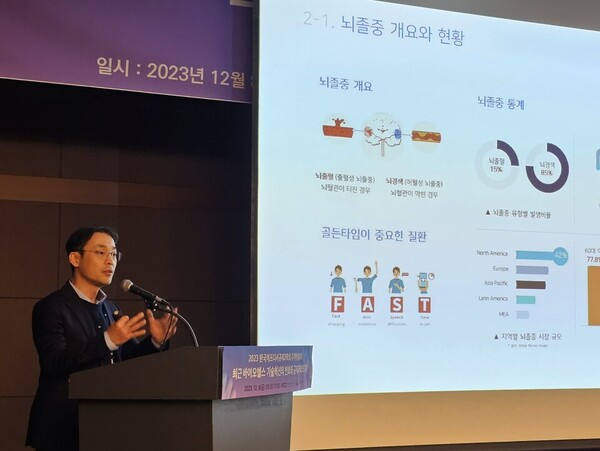
"JLK has many strategies in place to enter the U.S. market. In particular, we plan to provide differentiated value in the U.S. healthcare market by providing accurate and rapid diagnosis methods using artificial intelligence (AI) technology in the field of stroke diagnosis."
JLK CEO Kim Dong-min shared these insights during the KFDC Society of Regulatory Science conference held at The K Hotel Seoul on Friday. Kim, who participated in the conference as a case study for successfully passing the integrated review and evaluation with innovative medical devices, revealed the company's strategy for overseas expansion and plans to generate revenue by applying medical fees without insurance coverage.
Regarding the effectiveness of JBS-01K, the company's AI-based cerebral infarction type classification solution, Kim said, "It is important to determine the appropriate treatment method within the golden time for stroke. By speeding up the transfer of patients through JBS-01K, we can shorten the treatment time and improve the prognosis of patients."
JLK passed the integrated review and evaluation of innovative medical devices last month, allowing it to apply for non-reimbursement for the JBS-01K. However, it has yet to receive a reimbursement code from the Health Insurance Review and Assessment Service.
"It is slightly later than we originally discussed, but we expect it to come out by mid-month," Kim said.
In addition to JBS-01K, JLK plans to enter the medical field with AI solutions developed through the integrated review and evaluation of innovative medical devices.
"Since the unreimbursed fee was applied to JBS-01K, medical institutions have been contacting us first. The temporary registration of health insurance has lowered the threshold for introducing the solution, helping to spread its use," said Kim.
Kim disclosed that the company stated its opinion to the National Evidence-based Healthcare Collaborating Agency (NECA) about our cerebral vascular occlusion early detection solution JBS-LVO last Thursday. "We believe that all of our solutions can be subject to the integrated review of innovative medical devices, and we are applying for one every month."
Kim also unveiled his blueprint for entering the U.S. market, explaining that the company is developing CT-related solutions for the U.S. market. JLK is conducting clinical trials for two products, JBS-LVO and JBS-04K, an AI analysis solution for cerebral hemorrhage based on computed tomography (CT), to enter the U.S. market.
"In Korea, after a CT scan in the emergency room, a brain hemorrhage is determined, and most often, an MRI is taken. This is because cerebral infarction lesions are highly visible, and we have the medical infrastructure to do an MRI within an hour,” Kim noted. "In contrast, it takes too much time to get to the hospital in the U.S., so we try to read as much information as possible from the CT.”
Stating that the company’s goal is to get FDA approval in the U.S. and then get NTAP (New Technology Add-on Payment) reimbursement, Kim said, "I think the best way to do that is to register our innovative products as innovative medical devices in the U.S. one after another and convince them of their validity."
Last month, JLK was entangled in controversy due to its executives' stock sell-off. Each of its two vice presidents sold 242,500 shares, representing 1.51 percent of JLK's total outstanding shares, and realized a profit.
CEO Kim issued an apology and promised to use 40 percent of its free cash flow for stock buybacks and to retire 100 percent of the shares at the time of full-scale sales in the future.
Related articles
- JLK partners with Harvard Medical School to study stroke AI solutions
- JLK faces investor backlash as executives dump shares amid product uncertainty
- Coreline Soft, JLK flood South American market with medical AI solutions
- JLK to supply lung disease solution to Japan
- JLK aims to earn ₩600 billion in annual sales by 2028 through US biz on brain AI analysis

